
ADHD Aha!
Understood.org, Laura Key
Listen to people share candid stories about the moment it clicked that they have ADHD. Host Laura Key, who’s had her own ADHD “aha” moment, chats with guests about common topics like ADHD and shame, mental health challenges, and more. Through heartfelt interviews, listeners learn about the unexpected, emotional, and even funny ways ADHD symptoms surface for kids and adults.
- 36 minutes 37 secondsA deeper dive on ADHD, sex, and consent (Cate Osborn is back!)
ADHD affects our whole life — even our sex life. Our friend Cate Osborn, who has a background in sex education, is back to chat with host Laura Key about executive function challenges that may pop up in the bedroom. Cate and Laura dive into topics like ADHD and consent, working memory, and rejection sensitivity.
Cate hosts another Understood.org podcast, Sorry, I Missed This, a show about ADHD, intimacy, and communication. Check it out for some deeper dives into this episode’s topics!
Note: This episode contains conversation about sexual assault.
Related resources
Hear Cate’s personal story: ADHD and hormones (Cate Osborn’s story)
Cate’s podcast, Sorry, I Missed This!
Timestamps
(02:34) Why it’s called “Sorry, I Missed This”
(6:50) Executive function impact on relationships
(10:04) “Sex is a task”
(12:20)Task initiation impact on relationships
(14:07) Communication, working memory, and consent
(16:31) Time perception, impulsiveness, and dating
(20:46) “It’s not your fault”
(23:19) How to approach consent as a person with ADHD
(27:33) Cate’s own journey with ADHD and sexuality
(30:09) How rejection sensitivity complicates consent
(33:32) Cate’s email
For a transcript and more resources, visit the ADHD Aha! page on Understood.
Want to share your “aha” moment? We love hearing from our listeners. Email us at [email protected].
Understood is a nonprofit organization dedicated to empowering people with learning and thinking differences, like ADHD and dyslexia. If you want to help us continue this work, donate at understood.org/give
21 January 2025, 5:00 am - 17 minutes3 generations of ADHD…and masking (Zoe Plotnick’s story)
At 14, Zoe Plotnick told her mom, “My brain’s broken.” Zoe wanted an ADHD evaluation, but her mom discouraged it, pointing to Zoe’s good grades. Zoe was eventually diagnosed with ADHD as an adult. She also learned that her mom was hiding her own ADHD all along.
Now Zoe, who’s a teacher, is unpacking the ADHD stigma that her family has carried for generations. And she’s advocating for her daughter who, in a twist of fate, was diagnosed with ADHD at age 14 — the same age Zoe was when she tried to get evaluated the first time.
Related resources
- Is ADHD hereditary?
- Masking my ADHD at work was exhausting, so I stopped
- How do I emotionally prepare for ADHD diagnosis?
Timestamps
((01:10) Zoe’s pandemic “aha” moment
(03:23) Pushing for an ADHD diagnosis as an adult
(05:22) Growing up with undiagnosed ADHD
(09:17) Asking for help when Zoe was 14
(12:32) Generational ADHD shame and masking
For a transcript and more resources, visit the ADHD Aha! page on Understood.org
Want to share your “aha” moment? We love hearing from our listeners. Email us at [email protected].
Understood is a nonprofit organization dedicated to empowering people with learning and thinking differences, like ADHD and dyslexia. If you want to help us continue this work, donate at understood.org/give
7 January 2025, 5:00 am - 18 minutes 56 secondsADHD or OCD? (Julianna Broadwater’s story)
For years, Julianna Broadwater’s therapist suggested looking into ADHD. But Julianna resisted. She had a past diagnosis of OCD, so she attributed her challenges to that. Plus she was the primary breadwinner in the family, so how could she have ADHD?
Then Julianna tried ADHD medication, and her thinking completely changed. The impulsive, intrusive thoughts that would pop into her head started to lessen. It was easy to swat them away like flies, instead of dropping everything to focus on them.
Julianna was diagnosed with ADHD during the pandemic. Hear about her OCD misdiagnosis, and how the symptoms she thought were her OCD actually stemmed from ADHD.
Related resources
- I have ADHD and OCD. Here’s what a weekend getaway looks like for me
- What is perseveration?
- ADHD and anxiety
Timestamps
(01:17) Julianna’s ADHD diagnosis story
(06:49) Julianna’s experience growing up
(11:42) Julianna’s OCD misdiagnosis
(13:59) Getting stuck on thoughts
(15:26) Never going back to how things were before the pandemic
For a transcript and more resources, visit the ADHD Aha! page on Understood.org
Want to share your “aha” moment? We love hearing from our listeners. Email us at [email protected].
Understood is a nonprofit organization dedicated to empowering people with learning and thinking differences, like ADHD and dyslexia. If you want to help us continue this work, donate at understood.org/give
24 December 2024, 5:00 am - 29 minutes 7 secondsThe ADHD failure cycle (Jared Robson’s story)
Growing up, Jared Robson got so sick of failing that he decided, “trying isn’t for me.” Jared got into trouble all the time and bounced around different high schools. He eventually graduated high school but admits that that might not have happened if his family weren’t so well-off.
Now, Jared’s a stay-at-home dad and thriving as a college student taking courses online (He has a 4.0 GPA!). Jared and Laura talk about the “hyperactive little boy” stereotype. Listen as he describes his quest to find stillness and how he thinks of the ADHD failure cycle today.
Related resources
- Understanding hyperactivity
- What is the school-to-prison pipeline? From Opportunity Gap
- ADHD in boys
Timestamps
(01:01) Jared’s school life growing up
(07:08) “Trying isn’t for me”
(10:54) Changing around high schools
(12:53) Trying out different colleges
(13:56) Managing expectations
(17:31) Jared’s “aha” moments
(20:14) Jared’s pandemic lifestyle change
(23:36) Jared’s mindset shift in the present day
For a transcript and more resources, visit the ADHD Aha! page on Understood.org.
Want to share your “aha” moment? We love hearing from our listeners. Email us at [email protected].
Understood is a nonprofit organization dedicated to empowering people with learning and thinking differences, like ADHD and dyslexia. If you want to help us continue this work, donate at understood.org/give
10 December 2024, 5:00 am - 29 minutes 16 secondsAuDHD, sensory meltdowns, and hormones (Sam Hiew’s story)
After Samantha Hiew had her second child at age 40, hormonal changes shed light on her ADHD symptoms. She was diagnosed with ADHD and, later, autism. Sam talks about her experience with AuDHD, including regulating emotions and sensory meltdowns. Sam also talks about her multicultural experience and the importance of community when you have ADHD.
Sam is a social entrepreneur, scientist, and advocate. She’s also the founder and director of ADHD Girls, an award-winning social impact organization that helps neurodivergent girls succeed.
Related resources
- What is AuDHD?
- A guide to hormones and ADHD
- adhdgirls.co.uk
- Sam’s personal website, samanthahiew.com
Timestamps
(01:21) What is ADHD Girls?
(02:59) Why was Sam questioning if she had ADHD?
(06:42) Sam’s multicultural experience with ADHD
(10:12) Sam’s ADHD symptoms
(12:04) Having both ADHD and autism
(14:32) Sensory meltdowns
(18:12) Sam’s childhood
(19:58) ADHD and hormones
(26:00) Where you can find Sam
For a transcript and more resources, visit the ADHD Aha! page on Understood.org
Want to share your “aha” moment? We love hearing from our listeners. Email us at [email protected].
Understood is a nonprofit organization dedicated to empowering people with learning and thinking differences, like ADHD and dyslexia. If you want to help us continue this work, donate at understood.org/give
26 November 2024, 5:00 am - 26 minutes 24 secondsGoing on the record with ADHD (Rakia Reynolds’ story)
In school, a teacher made Rakia Reynolds push her desk all the way to the principal’s office for getting in trouble. Rakia had undiagnosed ADHD. She was energetic, creative, and the class clown. Rakia is now a businesswoman and creative leader with diagnosed ADHD — a diagnosis that she never shared publicly… until now.
Hear from Rakia, the founder and executive director of Skai Blue Media, on why she shied away from talking about her ADHD until now. Did a level of success make it feel safer to talk about? And if so, what can we learn from that?
Related resources
- Rakia’s company, skaibluemedia.com
- Why some kids clown around in class
- 32 examples of workplace accommodations
Timestamps
(01:41) Speaking publicly about having ADHD
(07:47) Rakia’s childhood and school life
(12:43) Hitting a wall in graduate school
(14:36) Rakia’s “aha“ moments
(16:51) ADHD strengths and weaknesses
(18:53) Coping at work
(21:36) How employers can create an inclusive and supportive workplace
To get a transcript of this show and check out more episodes, visit the ADHD Aha! podcast page at Understood.
Want to share your “aha” moment? We love hearing from our listeners. Email us at [email protected].
Understood is a nonprofit organization dedicated to empowering people with learning and thinking differences, like ADHD and dyslexia. If you want to help us continue this work, donate at understood.org/give
12 November 2024, 5:00 am - 25 minutes 57 secondsWhat’s scary about ADHD? (Ghost hunter Em Schulz’s story)
Em Schulz thought they were just lazy growing up. Years later, after discovering that not everyone’s TikTok was full of ADHD tips that “weirdly work,” they realized they might have ADHD.
Em is a paranormal investigator (aka ghost hunter) and co-host of the And That’s Why We Drink podcast. Em and Laura chat about ghosts and ghosting, as in ghosting relationships — a not uncommon ADHD behavior. And Em shares their take on whether people believe less in ghosts or ADHD.
Related resources
- Em’s podcast website, andthatswhywedrink.com
- “Is ADHD real?” What experts say when people doubt ADHD
- ADHD fact sheet
Timestamps
(01:32) What it’s like being a paranormal investigator
(06:13) What do people believe in less: ADHD or ghosts?
(07:02) Growing up with undiagnosed ADHD
(10:42) Em’s pandemic diagnosis
(14:02) TikTok ADHD tips that resonated with Em
(15:39) How did Em’s ADHD diagnosis change their life?
(16:55) What’s scary about ADHD?
(18:34) Why Em became a paranormal investigator
(19:33) ADHD creativity at night
(20:28) Scary movies
(23:43) Where you can find Em
To get a transcript of this show and check out more episodes, visit the ADHD Aha! podcast page at Understood.
Want to share your “aha” moment? We love hearing from our listeners. Email us at [email protected].
Understood is a nonprofit organization dedicated to empowering people with learning and thinking differences, like ADHD and dyslexia. If you want to help us continue this work, donate at understood.org/give
29 October 2024, 4:00 am - 24 minutes 41 secondsWhen ADHD is mistaken for disobedience (Kayla Sanders’ story)
If you like this show, consider making a donation this holiday season. 100% of your donation will go towards helping us create more podcasts (like this one!). Click here to make a gift today.
Growing up as a Black girl with undiagnosed ADHD, Kayla Sanders learned very early that getting into trouble was not an option. Kayla was imaginative, playful, and extremely bright. She was also hyperactive, which was occasionally mistaken for disobedience.
One incident in particular in the first grade left a lasting mark on Kayla. From then on out, Kayla did everything she could to avoid causing trouble for her hard-working, loving mom. She pushed down her hyperactivity and masked her symptoms for years. Then, during the pandemic, Kayla was finally diagnosed with ADHD.
Join Kayla and host Laura Key’s chat on ADHD and masking, and the added pressure that comes from racial bias.
Related resources
- To be Black in America with a learning disability
- Bias in school discipline: When the teacher says your child is “acting out”, from Opportunity Gap
- ADHD and rejection sensitive dysphoria (RSD)
Timestamps
(01:10) Kayla’s pandemic ADHD diagnosis story
(06:53) Kayla’s childhood behavior
(09:45) The pressure to mask ADHD as a Black woman
(13:56) Covering up “mistakes” in the classroom
(15:35) Kayla’s relationship with her mom
(20:11) Cultural masking, and the intersection of ADHD and race
To get a transcript of this show and check out more episodes, visit the ADHD Aha! podcast page at Understood.
Want to share your “aha” moment? We love hearing from our listeners. Email us at [email protected].
Understood is a nonprofit organization dedicated to empowering people with learning and thinking differences, like ADHD and dyslexia. If you want to help us continue this work, donate at understood.org/give
15 October 2024, 4:00 am - 29 minutes 42 secondsEmotional regulation — and yelling — as a mom with ADHD (Patricia Sung’s story)
Patricia Sung was diagnosed with ADHD in her first year of college. It wasn’t until she became a mother, and other people relied on her, that she realized just how much ADHD affected her.
Patricia now hosts the Motherhood in ADHD podcast. Join Patricia and host Laura Key as they talk about managing emotions with ADHD. Patricia explains the concept of “raging” — that moment when you go from 99 to 100 and emotions boil over. She also shares strategies that can help.
Related resources
- Building self-compassion skills
- ADHD and anger
- Patricia’s podcast, Motherhood in ADHD
Timestamps
((01:10) Patricia’s diagnosis story
(06:16) How “ADHD” changed for Patricia when she became a mom
(09:09) ADHD mom challenges
(21:47) Acknowledging realistic “wins” for women with ADHD
(26:41) How you can join Patricia
To get a transcript of this show and check out more episodes, visit the ADHD Aha! podcast page at Understood.
Want to share your “aha” moment? We love hearing from our listeners. Email us at [email protected].
Understood is a nonprofit organization dedicated to empowering people with learning and thinking differences, like ADHD and dyslexia. If you want to help us continue this work, donate at understood.org/give
1 October 2024, 4:00 am - 24 minutes 20 secondsFear of rejection with ADHD runs deep (Matthew’s story)
Matthew Raghunauth always felt like he was a little lazy and sluggish — that’s just how he was. Then the time came to return to office after the pandemic, and he really started struggling at work. He questioned why he would put things off so much. He was scared to mess up, and afraid that his colleagues would think he’s a bad employee.
Matthew is an artist and UX designer who was diagnosed with ADHD about a year and a half ago. Join Laura and Matthew as they talk about this ADHD fear of being “found out,” and a grown-up view of growing up.
Related resources
- ADHD and rejection sensitive dysphoria (RSD)
- Imposter syndrome at work: How I stopped feeling like a fake
- Not lazy, but exhausted from analysis paralysis (Emily’s story)
Timestamps
(01:25) Why did Matthew seek out an ADHD evaluation?
(05:59) ADHD and prioritization overload
(07:23) Anxiety and fixations while growing up
(10:10) Putting off things out of fear of failing and being rejected
(12:34) ADHD and catastrophizing
(15:32) Are we really “too sensitive”?
(16:38) When “growing up” means taking care of yourself
(21:20) The added pressure of being first generation American
To get a transcript of this show and check out more episodes, visit the ADHD Aha! podcast page at Understood.
Want to share your “aha” moment? We love hearing from our listeners. Email us at [email protected].
Understood is a nonprofit organization dedicated to empowering people with learning and thinking differences, like ADHD and dyslexia. If you want to help us continue this work, donate at understood.org/give
17 September 2024, 4:00 am - 31 minutes 54 seconds“You can’t have ADHD” (Farah Jamil’s story)
Farah Jamil had to stand up for herself when two health care providers told her she couldn’t have ADHD. The reasons cited? One thought she was too smart, charming, and cared for to have ADHD. The other seemed to question whether ADHD was even real. Fortunately, Farah has strong self-advocacy skills that allowed her to debunk these myths in real time.
Farah is an executive coach, ADHD life coach, and the founder of the community groups Muslim ADHDers and Interfaith ADHDers. Listen as host Laura Key and Farah bust common ADHD myths. They also talk about how ADHD can make keeping friends hard.
Related resources
- From Sorry, I Missed This: The impact of ADHD on workplace relationships
- 8 common myths about ADHD
- Muslim ADHDers
- Interfaith ADHDers
Timestamps
(01:14) Farah’s first attempt to get an ADHD diagnosis
(05:11) Unpacking the 4 myths her doctor told her about ADHD
(09:22) Farah’s second attempt to get an ADHD diagnosis
(10:55) What was Farah struggling with?
(13:41) Why is Farah surprised she “still has friends”?
(18:53) The ADHD communities Farah has founded
(27:24) Farah’s advice
(29:53) Where you can find Farah
To get a transcript of this show and check out more episodes, visit the ADHD Aha! podcast page at Understood.
Want to share your “aha” moment? We love hearing from our listeners. Email us at [email protected].
Understood is a nonprofit organization dedicated to empowering people with learning and thinking differences, like ADHD and dyslexia. If you want to help us continue this work, donate at understood.org/give
3 September 2024, 4:00 am - More Episodes? Get the App
Your feedback is valuable to us. Should you encounter any bugs, glitches, lack of functionality or other problems, please email us on [email protected] or join Moon.FM Telegram Group where you can talk directly to the dev team who are happy to answer any queries.
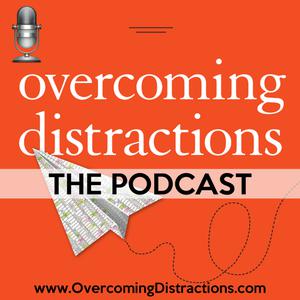 Overcoming Distractions-Thriving with ADHD, ADD
Overcoming Distractions-Thriving with ADHD, ADD
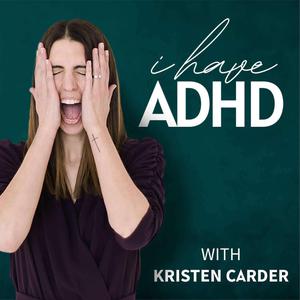 I Have ADHD Podcast
I Have ADHD Podcast
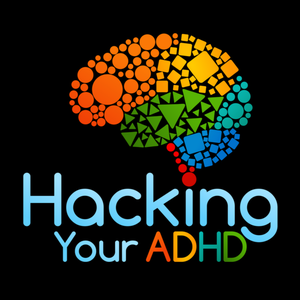 Hacking Your ADHD
Hacking Your ADHD
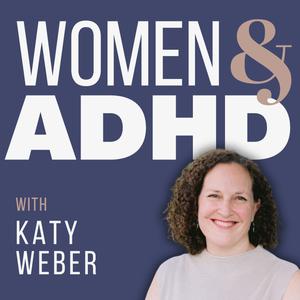 Women & ADHD
Women & ADHD
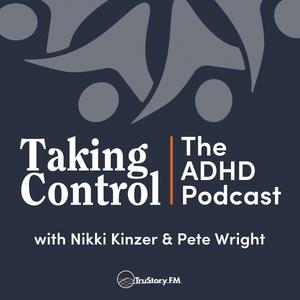 Taking Control: The ADHD Podcast
Taking Control: The ADHD Podcast
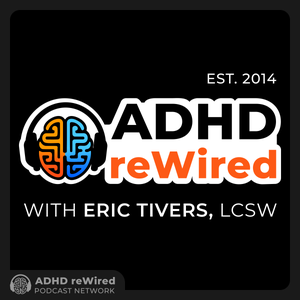 ADHD reWired
ADHD reWired